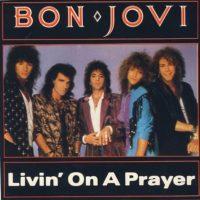
They are three of the most inescapable songs in the Classic Hits format: “Don’t Stop Believin’,” “Eye of the Tiger,” and “Livin’ on a Prayer.”
I don’t need to hear them again. When they come on while I’m working, I need to be very busy to let them play through. (Or else it’s a station I really need to hear for work.) But as a programmer, I understand their power. And I wish we had something new like them in today’s pop music.
It’s something I’ve been thinking about a lot recently while working on a project for the Classic Hits format, but also because of looking at our Song of the Summer 2022 prospects in yet another year that makes even thinking about Song of the Summer difficult.
In doing so, I’ve come to realize that those three songs in particular represent a category that doesn’t exist in contemporary pop music: uptempo songs of encouragement and determination; songs that are brooding and propulsive at once. Those songs are undoubtedly part of the reason for the all-ages potency of Classic Hits and Classic Rock now. (“Positive and encouraging” has, of course, been the positioner for years for K-Love, and Contemporary Christian is one of the only current-driven formats that has grown.)
Eighties pop was known for songs that acknowledged the darkness at the edge of town in a much-less-optimistic way. Classic Hits is also the format of “Every Breath You Take,” “Tainted Love,” “Sweet Dreams (Are Made of This),” and “In the Air Tonight.” “Don’t Stop Believin’” and “Livin’ on a Prayer” are not the only songs that set the tone at Classic Hits, but they are certainly part of its success, and they are the ones without a current equivalent.
In 2020, we had a Song of the Year in “Blinding Lights” that channeled ‘80s pop, but its edgier side. Our Song of the Summer, “Watermelon Sugar,” was the comfort food, but came with the footnote of both the song and its video having been written before COVID and George Floyd.
In 2021, the Song of the Year, “Levitating,” was the diversion. The Song of the Summer was “Good 4 U” and it captured an anger — couched as personal, not societal — still being reflected in songs a year later.
With Harry Styles’s return in 2022, ’80s pop is again the motor, but the feel is melancholy and the message is “nothing is the same/as it was.” Its closest competitors include Lizzo’s “About Damn Time,” the emerging-into-the-sunlight song that artists have been reluctant to release until now. Between those songs and Jack Harlow’s “First Class,” what you see as the summer song may come down to how you’re feeling in August.
The song that lands most squarely between the regretful and the aspirational is Lady Gaga’s “Hold My Hand.” Being a ballad from a Top Gun movie immediately prompts comparison to “Take My Breath Away,” but “Lean on Me” is a better comparison. (So is the 1994 Hootie & the Blowfish song that shares a title with Gaga, and is also a product of hard times.)
I would normally be publishing the “Handicapping the Song of Summer” article this week. I’m holding that one until May 31. I’ve been encouraged in the past to write the column about hit music and the national mood. I’ve also been warned not to assume there was a national mood in our divided times. CHR’s 2006-2013 rebound carried through the Gulf War, Hurricane Katrina, and the 2008 collapse, but it was when it became clear a year later that we had not descended into a second great depression that the party-rock anthems really took hold. By the mid-decade, it was “Don’t Let Me Down” — morose, repetitive, desperate — that set the tone. (I’ve also noted recently how true love ballads are in short supply.)
It’s hard to ask artists to write what they are not feeling right now. But it’s worth noting that “Don’t Stop Believin’” and “Eye of the Tiger” were both written in the depths of a recession. “Livin’ on a Prayer” was arguably the product of happier times, but the 1987 stock market crash followed not far behind.
I’ve commented before how a lot of the songs that were rock-radio hits in WLLZ Detroit (and other Midwestern cities) in the early ’80s — “No Time to Lose,” “Last Chance,” “Got to Rock On” — spoke to recession-era despair. In 1981, even somebody unfamiliar enough with the city to write about “South Detroit” would see it as emblematic. And in 1981, Detroiters made “Don’t Stop Believin’” a hit almost immediately as an album cut, and nobody was particularly hung up on the geography.
I’m not unrealistic about what a change in our musical fortunes can do even for radio at this moment. That sounds naïve enough, so I know how suggesting music as a unifier or even a conduit for understanding reads at this moment.
But if you’re reading this column in the first place, we probably do agree about the role that music plays in our lives, and that if the music isn’t right, not much else is going to be either. In 1981, my generation didn’t turn to “Happy Days Are Here Again.” It didn’t have to. If listeners are now turning to songs older than they are for encouragement, it says something about what’s missing now.
